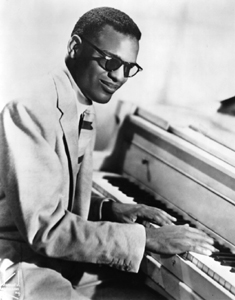The legendary Ray Charles was an architect of soul music. He was a pioneer in creating cross-genre songs and established a distinct sound by combining R & B, rock, gospel and country music styles.
Born with the name Ray Charles Robertson, Charles grew up in the small town of Greenville, Florida. He was five when he began losing his sight and was completely blind at the age of seven, apparently due to glaucoma. Local boogie-woogie pianist Wylie Pitman peaked Charles’ musical curiosity by playing on an old upright piano in his small-town cafe. Pitman eventually taught Charles on the piano until he received formal lessons and learned to write music in Braille at the St. Augustine School for the Deaf and Blind.

Charles began to earn a modest living as a musician at the age of 15, playing as a sideman or solo act calling himself Ray Charles to distinguish himself from the boxer Sugar Ray Robertson. He became a member of southern band The Florida Playboys where he began to don his signature sunglasses. In 1949, he put Florida far behind and moved to Seattle where he recorded his first single Confession Blues which soared to number two on the R&B charts.
In the mid-1950s he expanded his studio band to include the Raelettes, a group of female backup singers who provided responses similar to a gospel choir, and they became a permanent part of his music. Charles reached the pinnacle of his success with the release of What’d I Say, a complex song that combined gospel, jazz, blues and Latin music. Despite some radio stations banning the song because of suggestive lyrics, it became a crossover top ten hit.

Charles helped racially integrate country and pop music during the 1960s and became one of the first African-American musicians given artistic control by a mainstream record company. He also used his music within the civil right movement through his famously cancelled concert at Paine College. Charles was scheduled to perform for a dance in Augusta, Georgia but he cancelled his performance after learning from students that the larger auditorium dance floor would be restricted to whites, while blacks would be obligated to sit in the balcony. He performed a year later at the desegregated hall with the Raelettes.
In 1979, Charles was one of the first Georgia-born musicians to be recognized in the Georgia State Music Hall of Fame. Charles’ version of Georgia on My Mind was made the official state song for Georgia.
Charles has one the most recognizable voices in history and influenced singers as varied as Elvis Presley, Aretha Franklin, Stevie Wonder, Van Morrison and Billy Joel. Charles will forever be known as the piano man with the bluesy voice who reshaped American music for a half-century, bringing the essence of soul to country, jazz, rock, standards and every other style of music he touched.
You can catch Ray Charles: A Tribute on October 18 at 7:30pm featuring the multi-faceted Matt Catingub, stunning soul singer Joni Nehrita and two time Grammy award nominee Steve Moretti.
Here’s Hallelujah I Love Her So from 1955.